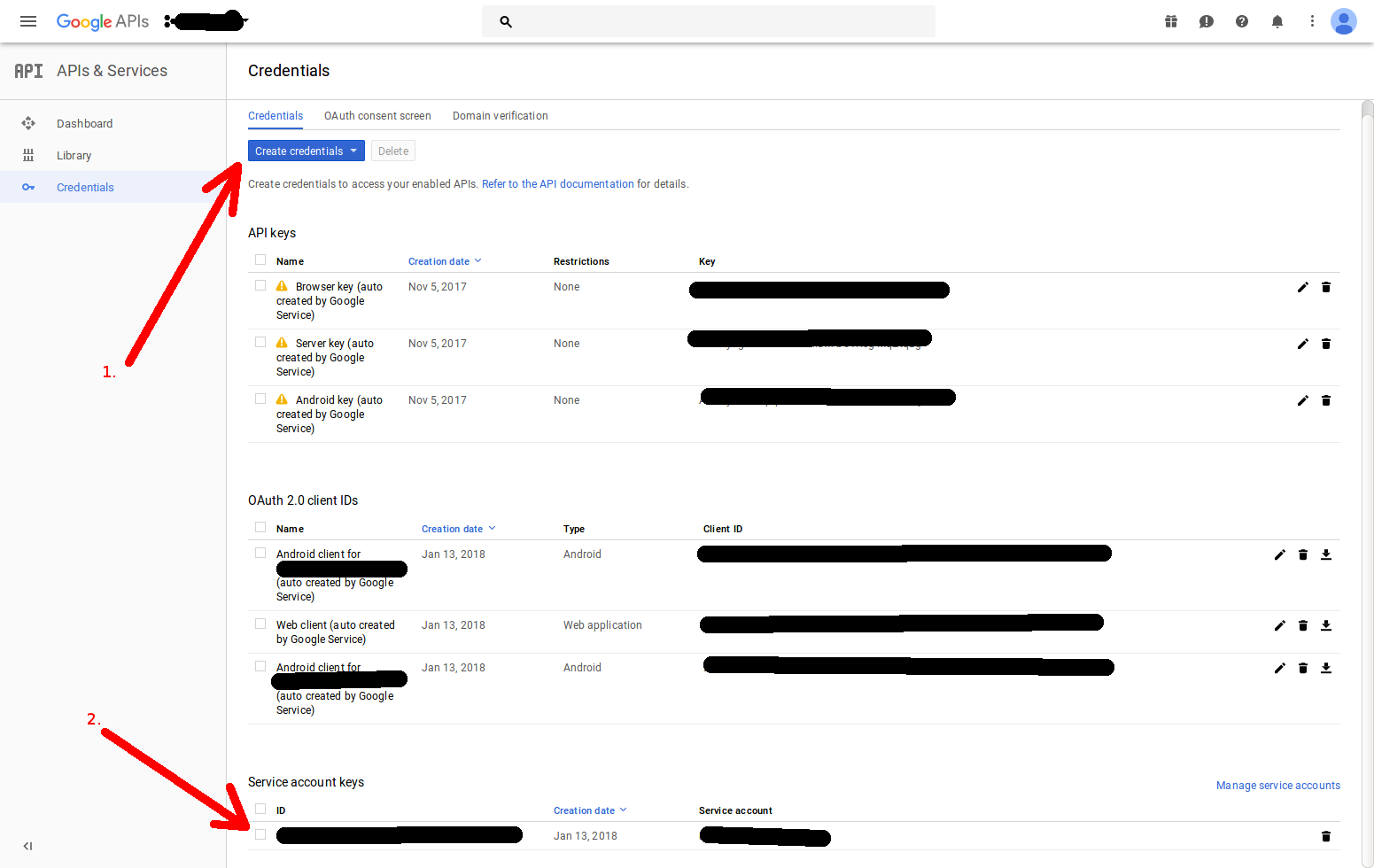After lots of headache (like always with Google APIs and services) I figured out how one can access Google Play Developer API information (like billing) by using existing APIs.
1.) Create in Developer API Console a service account (JSON) key:
![enter image description here]()
2.) Download this service-account-private-key.json file (don't mistake it with the OAuth2.0 client secret file!).
3.) In Google Play Developer Console go to Settings -> Users & Permissions -> Invite New User and set as user e-mail of the new user the client_email from the downloaded file. Assign the access rights you want to give to this users via the checkboxes inside this view (for example 'View financial data').
4.) Add the proper dependency to your project (version ...-1.23.0 does not work for me):
<dependency>
<groupId>com.google.apis</groupId>
<artifactId>google-api-services-androidpublisher</artifactId>
<version>v2-rev50-1.22.0</version>
</dependency>
5.) Load the service-account-private-key.json file into your application. In my case it's a webserver:
@Singleton
@Startup
public class WebserverConfiguration
{
private String serviceAccountPrivateKeyFilePath;
/** Global instance of the HTTP transport. */
public static HttpTransport HTTP_TRANSPORT;
/** Global instance of the JSON factory. */
public static JsonFactory JSON_FACTORY;
private GoogleCredential credential;
@PostConstruct
public void init()
{
assignServiceAccountFileProperty();
initGoogleCredentials();
}
public String getServiceAccountPrivateKeyFilePath()
{
return serviceAccountPrivateKeyFilePath;
}
public GoogleCredential getCredential()
{
return credential;
}
private void initGoogleCredentials()
{
try
{
newTrustedTransport();
newJsonFactory();
String serviceAccountContent = new String(Files.readAllBytes(Paths.get(getServiceAccountPrivateKeyFilePath())));
InputStream inputStream = new ByteArrayInputStream(serviceAccountContent.getBytes());
credential = GoogleCredential.fromStream(inputStream).createScoped(Collections.singleton(AndroidPublisherScopes.ANDROIDPUBLISHER));
}
catch (IOException | GeneralSecurityException e)
{
throw new InitializationException(e);
}
}
private void newJsonFactory()
{
JSON_FACTORY = JacksonFactory.getDefaultInstance();
}
private void assignServiceAccountFileProperty()
{
serviceAccountPrivateKeyFilePath = System.getProperty("service.account.file.path");
if (serviceAccountPrivateKeyFilePath == null)
{
throw new IllegalArgumentException("service.account.file.path UNKNOWN - configure it as VM startup parameter in Wildfly");
}
}
private static void newTrustedTransport() throws GeneralSecurityException, IOException
{
if (HTTP_TRANSPORT == null)
{
HTTP_TRANSPORT = GoogleNetHttpTransport.newTrustedTransport();
}
}
}
6.) Now I am able the fetch Google Play Developer API information, e.g. reviews:
private void invokeGoogleApi() throws IOException
{
AndroidPublisher publisher = new AndroidPublisher.Builder(WebserverConfiguration.HTTP_TRANSPORT, WebserverConfiguration.JSON_FACTORY, configuration.getCredential()).setApplicationName("The name of my app on Google Play").build();
AndroidPublisher.Reviews reviews = publisher.reviews();
ReviewsListResponse reviewsListResponse = reviews.list("the.packagename.of.my.app").execute();
logger.info("review list response = " + reviewsListResponse.toPrettyString());
}
This worked.
I cannot test it yet, but I'm sure that fetching the billing information works as well:
private SubscriptionPurchase getPurchase() throws IOException
{
AndroidPublisher publisher = new AndroidPublisher.Builder(WebserverConfiguration.HTTP_TRANSPORT, WebserverConfiguration.JSON_FACTORY, configuration.getCredential()).setApplicationName("The name of my app on Google Play").build();
AndroidPublisher.Purchases purchases = publisher.purchases();
SubscriptionPurchase purchase = purchases.subscriptions().get("the.packagename.of.my.app", "subscriptionId", "billing token sent by the app").execute();
//do something or return
return purchase;
}

